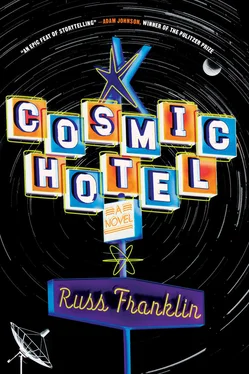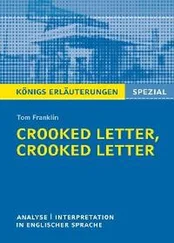The next night I went to the race with him, and the roar of forty-four cars going around on a half-mile track was unbearably loud even though I had those foamy earplugs in. I looked over and Charles was filming the green-flag start with his phone, body tilted back so he could see everything in the tiny screen, his mouth formed into a holler though no one could hear him. Van Raye had obtained a rare pleasure in this life: he had let go.

I had gone to the demolition of the Grand Aerodrome because I wanted to see if I felt the memory of all the old lives lived there, those that had crossed through that hotel finally disappearing in the great cloud of dust. Of course I couldn’t. The hotel is gone and there is no way ever to go back into the hotel room with the blue light and talk to Elizabeth.
When I fly through Atlanta, I take a cab to that totally industrialized side of the airport, passing the Gypsy Sky Cargo compound that will be there until the end of times. I stand on the bare dirt in the place that was the Grand Aerodrome and watch the sky and the Gypsy compound, and there is a small part of me that watches for Elizabeth’s posture over there on the other side. I really can’t fathom that I’ll never see her again. I need her so badly every day. Sometimes I catch myself thinking, The next time I see Elizabeth I’ll tell her. . Memories overlap between people, and as each person dies, certain memories disappear. Perhaps that instinct to believe I will one day see her, this is where the concept of heaven comes from, an archetypal image of the place we will reunite and began new memories and talk about the old ones. I’m pretty sure there’s no heaven; the world, the universe, simply doesn’t work like that. I’ve certainly seen no evidence of it other than an alien that knew a few things that seemed incredible, an alien that doesn’t exist to me now. Writing about it makes me close to the feeling one last time before I let it go forever. Writing about it is as real as it will ever get.

Ursula swings. Dubourg carries Boy on the hunt for the mole in the backyard. The child Ursula is carrying is not a hybrid of Ursula and some alien, but I say nothing to her. When the new baby arrives, it will look Indian. There’ll be no denying it’s my child, but do the truly converted ever face facts?
We’ll raise it just like we do Boy. Ursula will find reasons why his or her skin is dark like mine, and I’ll never say anything to convince her otherwise, and hopefully we will make more. The idea of her not believing in what she wants to believe scares me, just like it would if Dubourg wanted to know what was in his case, or if he stopped believing in God.
Ursula flies in and lives with the boy and me in hotels across America. Dubourg comes when he can.
There is never a time when I don’t walk into a new hotel room, weary from the road, and plop facedown on a bed. Boy stares at me. My body makes the crater in the comforter, and that’s when I think about Butch’s body on the bed and remember the gravity we all make and this is what being is: an existence, a created crater. We all just simply go away, and our gravity disappears.
Boy travels with me just like I did with Elizabeth, me rolling our luggage with one hand, carrying the bag of water and the fish for him through the airports, finding kind TSA agents who will let a boy and a betta fish into the Airport Zone, the fish inside warping big, small, big, small.
When we are alone, I change my voice and say, “I’m Randolph, never Randy. Hello, Number 2, what is this place we are in?” but either he’s too young to understand or he doesn’t buy it. But the boy loves the Desert Motor Court, and, by default, must not hate my periods of paralysis because that’s where we go together and slow down.
Here in the desert the fantastic and mysterious mole lives, and Boy gets to go there, and Dubourg is there and his Earth mother, Ursula, and he can search for the mole, the mole always just outside of Boy’s beam of light.
The ritual of the mole is this: When I am paralyzed, I lie in the reclining chair beneath the darkening sky, Leggett staring at this weird nuclear family from the glass cube of the Desert Motor Court’s lobby. Dubourg lifts Boy up in his arms and carries him horizontally, flashlight in Boy’s hand. Boy tries to shine the light in the sage and the bushes looking for the mole.
Ursula asks Boy, “Who are you looking for?”
“The mole ,” Boy says, eyes wide, and the way he says “mole” makes it sound like the most incredible, unbelievable, wonderful, most mysterious creature in the universe— the mole .
“When does the mole come out?” Ursula asks.
“At night,” Boy responds.
“Where does the mole live?”
“Underground,” the boys says.
I can see why someone outside of our group would think everything I’ve told you is unreal — headlights, a dog’s eyes, an alien — but to me the problem is it’s too real, and it’s all going by in such a hurry. How many time mines are out there waiting for me, those terrifying moments when your life leaps forward, and you’ll just find yourself at the end? We are always only one answer from the end.
The flashlight beam bounces over the yard thanks to Dubourg’s purposefully shaky carrying, but there is a black shape that leaps from one bush to the other. “There!” the boy shouts. Dubourg plays along and chases, shaking the boy so that the beam can’t quite be still. The black shape scoots along the dirt, bouncing, and jerks into the next bush. “The mole!” the boy shouts, Dubourg carrying him after it. “The mole! The mole! The mole!” The game ends too quickly, Ursula reeling the last of the line in and hiding the black sock beneath her leg. “The mole,” Boy shouts, Dubourg out of breath, and the boy knows the mole can’t be found.
“Where has the mole gone?” Dubourg asks.
“Underground!” Boy shouts.
I want very badly to believe in the mole.











![Benjamin Franklin - Memoirs of Benjamin Franklin; Written by Himself. [Vol. 2 of 2]](/books/747975/benjamin-franklin-memoirs-of-benjamin-franklin-wr-thumb.webp)
![Benjamin Franklin - Memoirs of Benjamin Franklin; Written by Himself. [Vol. 1 of 2]](/books/748053/benjamin-franklin-memoirs-of-benjamin-franklin-wr-thumb.webp)